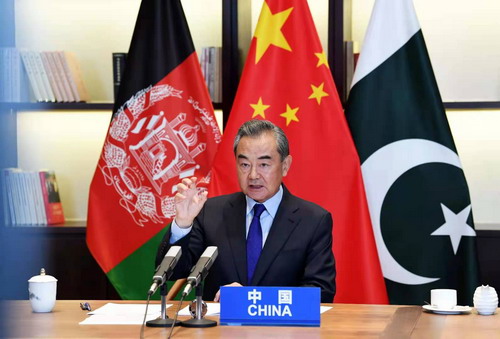| Wang Yi Talks about the Five Propositions for Advancing Peace and Reconciliation in Afghanistan |
| 2021-06-04 14:22 |
|
On June 3, 2021, State Councilor and Foreign Minister Wang Yi presided over the 4th China-Afghanistan-Pakistan Trilateral Foreign Ministers' Dialogue in Guiyang. Afghan Foreign Minister Mohammad Haneef Atmar and Pakistani Foreign Minister Shah Mahmood Qureshi attended the dialogue. Wang Yi said, the accelerated unilateral withdrawal of troops by the United States and some Western countries from Afghanistan poses a challenge to and also offers an opportunity for Afghanistan and other countries in the region. The challenge lies in whether the withdrawal will lead to changes in the talks among Afghans, wars and strife. The opportunity is that the pull-out of external military forces from Afghanistan will create conditions and open up prospects for the Afghan people to truly take control of their own future and destiny. China believes that the fundamental way to overcome the challenge and seize the opportunity is to unswervingly promote the peace and reconciliation process within Afghanistan. To this end, China puts forth five ideas and propositions: First, adhere to the fundamental "Afghan-led, Afghan-owned" principle. Afghanistan belongs to the Afghan people. We hope that all parties to the Afghan peace talks will put the interests of the country and its people in the first place and jointly explore a governance model and development path that suit to the national conditions of Afghanistan. We support all parties in Afghanistan to jointly build an extensive and inclusive political structure for the future, which pursues a moderate Muslim policy and continues to firmly combat terrorism internally, and promotes peace diplomacy on all fronts externally, especially being in friendly terms with neighboring countries. Second, maintain the momentum of intra-Afghan talks. China is pleased to see the recent resumption of talks between the Afghan government's peace negotiating team and the Taliban negotiators in Doha, and hopes that this situation will be consolidated and continue. The peace and reconciliation process in Afghanistan is at a critical moment, the opportunity for peace talks should not be missed, and the reconciliation process should not be reversed. China hopes that all parties to the peace talks in Afghanistan will steer clear of disruptions, show each other goodwill, focus on consensus, clarify the roadmap and timetable for reconciliation as soon as possible, and work out realistic and feasible short-, medium- and long-term programs. China is willing to hold an intra-Afghan dialogue at an appropriate time and will provide all convenience and support for this. Third, bring the Taliban back into the political mainstream. The international community has reached an important consensus that all parties in Afghanistan should strictly abide by the UN Security Council Resolution 2513. China is ready to work with all stakeholders of Afghanistan, including Pakistan, to make more efforts to promote peace talks and mediation, creating necessary environment for intra-Afghan negotiations and Afghanistan peace and reconstruction. China hopes that the Afghan government will strengthen its confidence in peace talks and put forward a more attractive plan for peace talks to encourage the Taliban to abandon past differences and meet each other halfway. Fourth, the international community and the countries in the region should provide full support. For some time to come, the United States will remain the biggest external factor affecting the Afghan issue. China, Afghanistan and Pakistan should work together to push for the orderly withdrawal of the U.S. troops and the fulfillment of its due obligations, so as to prevent the deterioration of the security situation in Afghanistan and avoid the return of terrorist forces. China suggested that Afghan should strengthen communication and cooperation with its friendly neighboring countries in a timely manner so as to form greater synergy for ceasefire, cessation of war and restoration of peace in Afghanistan. Not long ago, China hosted "China + Central Asia" (C+C5) Foreign Ministers' Meeting, which encouraged all parties to release the Joint Statement on the Afghan Issue. Going forward, we will support the Shanghai Cooperation Organization in playing a bigger role in the peace and reconciliation in Afghanistan. Fifth, strengthen sincere cooperation among China, Afghanistan and Pakistan. Since last year, Pakistan has played a unique role in facilitating the signing of the peace agreement between the United States and Taliban and the initiating of intra-Afghan negotiations. China hopes that Pakistan will continue to make good use of its own advantages and make new and constructive efforts. China also hopes that the Afghan side will take a positive view of Pakistan's sincerity and contributions. China proposes to explore the establishment of a trilateral special envoy dialogue mechanism for peace and reconciliation in Afghanistan within the framework of the China-Afghanistan-Pakistan trilateral foreign ministers' dialogue to maintain close communication on the situation of the Afghan peace talks and specific steps for their advancement. China can also expand cooperation under the China-Pakistan Economic Corridor to Afghanistan to raise the level of economic and trade cooperation and connectivity between Afghanistan and the countries in the region, helping Afghanistan enhance its capacity for independent development and gradually realize a virtuous circle of peace and development. |
| |||||||||||||||
|
|||||||||||||||


